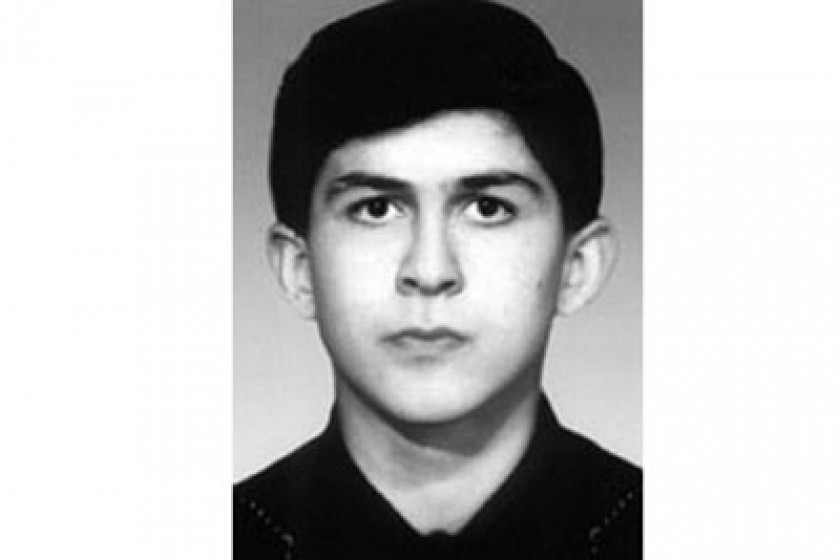
I Can't Wait Any More
"I can't imagine that he's alive," the mother of a soldier who went missing in action in the Karabakh War admitted painfully. "If he were, wouldn't he know that we're waiting?"
Sirush Hakobyan still has a list of 21 Azerbaijani soldiers who were captured during the war, and she keeps their photographs in an album along with those of her own son. Once these soldiers were her only hope of finding her son. She and her husband were told in Karabakh that if their son was found by the parents of one of the 21 Azeribaijanis, they could exchange him for one of them. But in twelve years, hope has turned into uncertainty.
"I still hope. But when I imagine getting a final answer, and it's bad news, I go crazy," the mother said, choking back tears.
The search for Vahe Yeghshatyan has not yielded any results. In May of 1993, the family learned from a friend that their son, who had secretly left his home in Vanadzor three months earlier, was now fighting in the Karabakh war. He and other soldiers were fired on when a tank they were in crossed the border during a battle in Martakert. Only one of them managed to escape. Wounded in the leg, Vahe was caught by the Azerbaijanis.
The soldier's capture was confirmed by his commander. The day after the gunfight, the officer talked with Vahe over the radio and found out that he had been taken prisoner. Vahe's father went to Martakert where he found Vahe's clothing, sports bag, and a picture of his dead uncle in the burned tank. Vaghinak Yegshatyan returned home with a certificate of his son's MIA status and an intriguing offer from Vahe's commanding officer.
The officer had promised to get their son back if Vahe's parents would provide 25 million Russian rubles. They had collected nearly all the money when Vahe's commander was killed in a gun-battle in Karabakh. With his death the family lost all traces of the soldier from Vanadzor. According to the Armenian Defense Ministry, 947 soldiers and civilians from Armenia and Karabakh have gone missing between 1988 and 2005. 224 of them are from Armenia. "Every time we heard that something happened, we went to check to see what it was," Vahe's mother said.
Now fifty years old, Sirush Hakobyan no longer remembers the exact chronology of events; they mean little to a woman who has been waiting for so many years. The last information she received was in 1999 or 2000, from a woman in Shushi.
"We received one letter in good Armenian, which said that the sender had my son's passport, and that we could get it." They subsequently found out that the letter had been written by a woman who had shown Vahe's passport to passengers on a Vanadzor bus and told them that Vahe was healthy and living with her. Once again, the Yeghshatyans followed their son's trail to Kharabakh. This trip was also in vain; they never found the woman who had written the letter. Somehow, the Ministry of Defense managed to get hold of the missing soldier's passport. I was with great reluctance that they handed it over to his parents.
Vahe's mother described her conversation with defense ministry officials: "When I said, 'You know something you're not telling me,' they told me, "What can we say? We can't find your son; he's dead."
Relatives have moved Vahe's belongings out of his room, in an attempt to ease his mother's suffering. Only his desk and a picture remain. The parents have stopped writing letters to various ministries and agencies. They're tired of knocking on doors and receiving inconclusive responses. The only help they receive from the government are special benefits which were awarded only after they presented a death certificate.
Their son was declared dead by the state two years ago, even though nobody knows where he is, or what happened to him. The government has never specified the status of soldiers who went missing in action in the Karabakh war. There isn't any legislation granting these soldiers special status and providing their families with an alternative to going to court to have them declared dead. The families take this step for different reasons, but mainly to improve their social condition. According to the defense ministry, 166 MIAs have already been declared dead by the court. Despite numerous statements by the ministry that there are government committees working on finding the lost Armenians in Karabakh, and that recently their work has been particularly intensive and productive recently, the families of those who are missing have lost all hope of finding their loved ones.
 Videos
Videos Photos
Photos
Write a comment